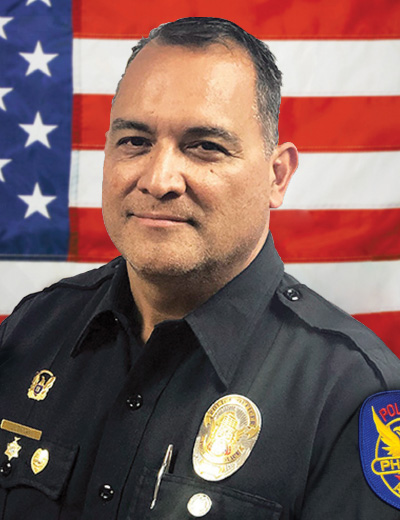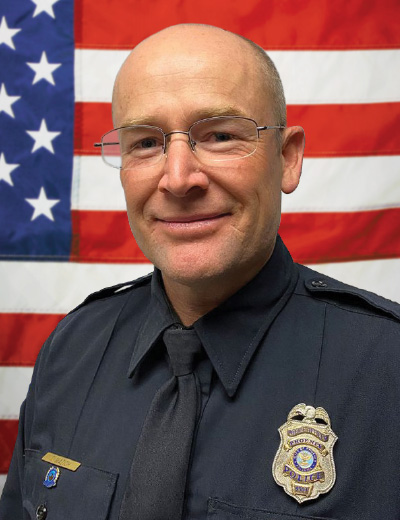Trustee's Message

Trustee
srobles@azplea.com
In my 24-year career with the city of Phoenix, I have been subjected to investigations that could have sidetracked my career. I can say that during my career, I have been part of the old way of doing things to an evolution of public safety today, which has painted us with a broad brush because of the wrongdoing of a few. I was in the patrol division for most of my career but have recently taken a position at the PLEA office as full-time release.
My experiences in both the old culture and new culture of police work have led me to realize that, today, career preservation must be a topic of interest. My idea of career preservation comes from not only my experience on the street but my representation experience. I have represented hundreds of officers for a myriad of policy violations, officer-involved shootings, the investigative review process, discipline review process, use-of-force boards and Loudermill hearings.
Even after all of these things, every officer would say, “I have learned from my mistakes.” Some of us have received discipline, and those people still move forward and have very successful careers. To put things into perspective, I have been subjected to a long-term internal investigation, industrial medical injuries and survived multiple police chiefs and changes in management that have changed this Department. I am letting you know that your career is most important; do something to preserve it.
My experiences in both old culture and new culture of police work have led me to realize that today, career preservation must be a topic of interest.
One of the easiest and most effective ways to preserve yourself and have a solid response to any complaint is to make sure your body-worn camera is on, per policy. Sometimes, the videos can be long, but they will prove your actions were correct at the time of the incident. Please do not get into the habit of turning off your camera prior to the finish of a contact or an arrest. No one will give you the benefit of the doubt if your camera is off. If your camera is not on, and a witness, business camera system or private company captures an incident that does not pass the headline test, it is harder to disprove wrongdoing. Be mindful of what you say or do when around other officers because they may have their cameras activated, even if the call for service is complete.
The second point I want to make is that omission, deviation or minimizing could be considered untruthful during an investigation. If you do not recall a specific detail, do not try and fill in the blank with a guess. The investigation will continue, and you will be compelled to answer any questions, but lying or untruthful statements make it very difficult for the representative to pursue the benefit of the doubt.
Please know that fact-finding interviews are not allowed at any point. If you feel that questioning could lead to discipline, then you have the right to representation, and we are available 24 hours a day on standby to assist you. In a respectful way, you may ask your supervisor, “Do these questions have to do with a policy violation?” To make things easier, if you get served with an NOI, call us to assist you.
Health and welfare: Please do not advise on calls, no matter how minimal the type of call is. You never know what will happen. We have time on our side when responding. Please use all of your resources that you have available. Your goal every night is to go home to the folks who love you. Resources exist for issues with post-traumatic stress disorder, domestic issues and alcoholism. Do not self-medicate, and you can always call the employee wellness bureau or PLEA to speak to someone. We take employee wellness seriously and do what we can to help support you.
Remember, you are protected by Title 38 of Arizona Revised Statutes, Police Officer Bill of Rights and our MOU, the Unit Member Rights. The things I have pointed out are from my experience and the outcomes when pertaining to integrity, policy violations and discipline handed out for those violations. Be safe, and contact us at the PLEA office if you need assistance.

Trustee
tmazich@azplea.com
A couple chiefs ago, I sent an email to ask the chief: “What is the chief going to do to improve morale?” The response I got was, “nothing.” He explained it was the employee’s responsibility to improve their attitude, which would improve morale. I respectfully disagreed and saw it differently. Sure, our attitudes could influence our job, but you can only keep a smile on your face for so long when you’re constantly under attack.
Is it even possible for an employer to improve morale in the workplace? Of course, it is! A simple Google search yields a plethora of ideas, examples and successful case studies. Sabbaticals, temporary reassignments, salary, work environment, praise and recognition are just a few. What is the easiest and biggest morale booster that any employer can do, especially a police department? Support! There is also trust, recognition, communication, fairness and leading by example. How about standing with officers and not protesters or even giving the benefit of the doubt to the officer when they are being scrutinized. Support doesn’t just come from a sergeant, lieutenant, commander or assistant chief. Support also needs to come from City leaders. Imagine if our recruiting posters were just like other local cities in the valley. “Come work where you are supported!” “We will not defund our police!” If Phoenix recruiting posters said come work for a city where you are supported from the top down, what effect would that have on morale?
What is the easiest and biggest morale booster that any employer can do, especially a police department? Support!
What do we do as officers when our employer believes improving the work environment is our sole responsibility? Our attitudes and mindset do play a big role in our mental well-being. First, you have to disconnect. Don’t live this life 24/7. Be mindful of the number of days you put the uniform on, picking up that extra shift or off-duty job beyond your normal work schedule. Having good friends outside of the workplace who aren’t police-related is also important. If you surround yourself with other officers off duty, your conversations always lead back to work. Find that healing time to disconnect from the job. Is it a hobby, the gym or spirituality? Find the thing that makes you happy. You have varied types of leave available. Do not be afraid to use these benefits. Whatever it is that clears your head, make time to do it and always put your family first. To the spouse who is reading this, make them make time.
We are not seeing any attempts at morale improvement by the Department, so it will come down to you. I used to tell the OITs that I could have them hating this job in just a few minutes based off my experiences that were negative during my career. The fact is I can keep complaining all I want and point out the obvious nonsense, but it’s not going to change. I would tell them the only way to survive this career is through your attitude and your health, mental and physical. Never lose your passion and sense of care for the job but understand the City determines what we do while on the clock. If the City wants us to deal with an incorrigible 7-year-old instead of responding to priority emergency calls, then so be it. If they want us to write a report when there’s no crime just because someone wants one, OK. These things are out of our control. Don’t let poor leadership decisions bring you down. Find the things in the job that bring you joy and focus on them.
PLEA is doing what we can to boost morale and camaraderie among members. Just a few of the fun things we are offering to the membership are a family day, the Fallen Officer Memorial Golf Classic, the Police Officers’ Ball, membership appreciation barbecues and family movie day.
Stay safe and wait for your backup!
